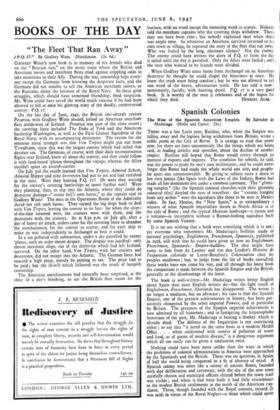BOOKS OF THE DAY
"The Fleet That Ran Away
GODFREY WINN'S new book is in memory of his friends who died on the "Russian run," on the arctic route where the British and American navies and merchant fleets tried against crippling odds to take munitions to their Ally. During the war, censorship kept every- one except the Germans from knowing the desperate facts, and the Germans did not trouble to tell the American merchant sailors, or the Russians, about the heroism of the Royal Navy. So these grim struggles, which should have cemented friendship, bred suspicion. Mr. Winn could have saved the world much rancour if he had been allowed to tell at once his glowing story of the deadly, controversial convoy : P.Q. 17.
On the last day of June, 1942, the British anti-aircraft cruiser Pozarica, with Godfrey Winn aboard, joined an American merchant fleet north-west of Iceland. Pozarica was part of the close escort ; the covering force included The Duke of York and the American battleship Washington, as well as the First Cruiser Squadron of the Royal Navy, with its accompanying destroyers. The reason for the ominous naval strength was that Von Tirpitz might put out from Trondhjem, since this was the largest convoy which had sailed that desolate sea. The Germans, of course, with their daily reconnaissance flights over Iceland, knew all about the convoy, and they could follow it with land-based 'planes throughout the voyage, whereas the Allies couldn't spare an aircraft-carrier. On July 3rd the escoft learned that Von Tirpitz, Admiral Scheer, Admiral Hipper and nine destroyers had put to sea and had vanished in the mist. Were they hunting P.Q. 17? Or were they waiting for the convoy's covering battleships to move further east? Were they planning, then, to slip into the Atlantic, where they could do desperate damage—" create hell's own havoc," as the captain said to Godfrey Winn? The men in the Operations Room of the Admiralty dared not risk such havoc. They turned the big ships back to deal with Von Tirpitz leaving the convoy to its fate: for when the ships- of-the-line steamed west, the cruisers went with them, and the destroyers with the cruisers. So at 8.30 p.m. on July 4th, after a day of heavy air attack, orders came for the covering force to abandon The merchantmen, for the convoy to scatter, and for each ship to make its way independently to Archangel as best it could.
In a sea polluted with submarines, under a sky patrolled by enemy 'planes, such an order meant despair. The despair was justified: only eleven merchant ships, out of the thirty-six which had left Iceland, survived. On the other hand, Von Tirpitz, with her cruisers and destroyers, did not escape into the Atlantic. The German force had exacted a high price, merely by putting to sea. The price had to be paid ; but the ill-will which followed was the result of lumpish censorship. The American merchantmen had naturally been surprised, at the close of a day's bombing, to see the British fleet steam for the
horizon, with no word except the menacing word to scatter. Nobody told the merchant captains why the covering ships withdrew. There may not have been time ; but nobody explained later when there was ample time. So whenever an American survivor returned to his own town or village, he repeated the story of the fleet that ran away. Who was fooled by the long, obstinate silence? Not the enemy. The enemy could have written the diary of P.Q. 17 from the day it sailed until the day it perished. Only the Allies were fooled ; only the men who wanted to be friends were divided.
When Godfrey Winn came home from Archangel on an American destroyer he thought he could dispel the bitterness at once. He knew the truth must bring comfort ; but he was not allowed to tell one word of the brave, adventurous truth. He has told it now: passionately, lucidly, with burning detail. P.Q. .r7 is a very good book. It is worthy of the men it celebrates and of the hopes for


































 Previous page
Previous page